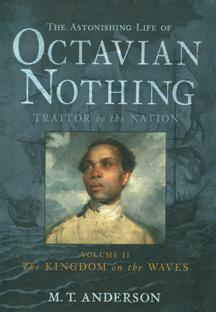Full Text Reviews: Bulletin for the Center... - 11/01/2008 Having in the last volume (The Pox Party, BCCB 11/06) escaped the most unenlightened experiments of the Enlightenment philosophers who held him captive, slave Octavian and his tutor, Dr. Trefusis, now make their way to Boston, where they take temporary refuge with a widow of Trefusis’ acquaintance. The pair realizes that this is not a permanent solution for two men who are likely to be accused of murder, and when Octavian hears that Lord Dunmore has promised freedom to any slave (of a Patriot master) who is willing to enlist in the British cause, Octavian and his devoted tutor travel to Virginia, where he joins the Royal Ethiopian Regiment. Service in His Majesty’s forces offers one cruel awakening after another: the ineptitude and open bigotry of commanders; the boredom and frustration of sitting idle offshore through a siege; the ridicule of comrades-in-arms who regard the prim, elegantly raised Octavian as a freakish oddity; the violence of which he himself is capable in battle and on raids; and the ultimate treachery of the British who renege on their promises as casually as the Sons of Liberty. While this follows the more familiar conventions of a war story, as opposed to the macabre eccentricity of the first volume, Octavian’s introspection born of a philosopher’s upbringing adds depth to the tale. The Pox Party winnowed readers cowed by the formal density of Octavian’s narration from those who revel in linguistic embellishment, and teens who return for Volume Two will, after a welcome two-page opening recap, glide smoothly into the challenging prose and find themselves rewarded with a fast-moving plot. Familiarity with The Pox Party is essential to understanding Octavian’s unique and censorious take on the Revolutionary War, and although Anderson leaves the door ajar, allowing for the possibility of allowing Octavian’s postwar experiences, there is a satisfying finality to the story at this book’s end, which leaves Octavian impoverished, alone, disillusioned, but very much in charge of his own destiny. EB - Copyright 2008 The Board of Trustees of the University of Illinois. School Library Journal - 09/01/2008 Gr 9 Up-Octavian, the 16-year-old slave whose story began in The Pox Party (Candlewick, 2006), continues his search for identity in this brilliant, affecting, and philosophical sequel. Octavian and his tutor escape from Octavian's master to relative safety in Boston where Octavian finds work as a violinist in a military band. After hearing of Lord Dunmore's promise of freedom for slaves, he enlists in the Royal Ethiopian Regiment. Following a loss at Norfolk, they then take up quarters aboard British ships, barely fending off starvation and smallpox. Octavian's uncertainty and doubt are tangible throughout. His detailed first-person narration is written in the richly expansive 18th-century prose introduced in volume one. He records the story while reviewing (and revealing to readers) his diary entries from the past year, so that "none of this shall pass from remembrance." He endures abuse, shame, grief, and humiliation, and comes close to despair; however, he is ultimately hopeful that humanity can aspire to more than warring and despoiling. Teens will identify with Octavian's internal tumult, how he experiences events as being acted upon him, and his transition from observer to participant, from boy to man. More than fascinating historical fiction, this is also a thoughtful and timeless examination of the nature of humanity and a critique of how society addresses (or ignores) identity, freedom, and oppression. Anderson's masterful pacing, surprising use of imagery and symbolism, and adeptness at crafting structure make this a powerful reimagining of slavery and the American Revolution dazzle.-Amy J. Chow, The Brearley School, New York City Copyright 2008 Reed Business Information. - Copyright 2008 Publishers Weekly, Library Journal and/or School Library Journal used with permission. Booklist - 06/01/2008 *Starred Review* The story begun in The Astonishing Life of Octavian Nothing, Traitor to the Nation; v. 1: The Pox Party (2006), a National Book Award winner and a Printz Honor Book, continues in this volume, which offers more awe-inspiring reinterpretations of America’s birth. After escaping the members of an Enlightenment college, Octavian, a teenage black slave, flees with his sympathetic tutor to the imperiled city of Boston, where the pair pose as loyalists to the Crown. As the war escalates, Octavian joins a Loyalist navy regiment that promises freedom to African Americans and enters into battle against the Patriots. Aside from a few essential interjections from others, Octavian narrates in the same graphic, challenging language used in the previous book, which Anderson has described as a “unintelligible eighteenth-century Johnsonian Augustan prose.” But readers need not grasp every reference in the rich, elegant tangle of dialects to appreciate this piercing exposé of our country’s founding hypocrisies. Even more present in this volume are passionate questions, directly relevant to teens’ lives, about basic human struggles for independence, identity, freedom, love, and the need to reconcile the past. Viewed through historical hindsight, Octavian’s final, wounded optimism (“No other human generation hath done other than despoil, perhaps we shall be the first”) will resonate strongly with contemporary teens. - Copyright 2008 Booklist. Loading...
|




